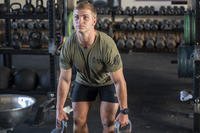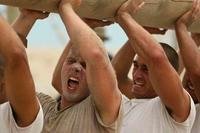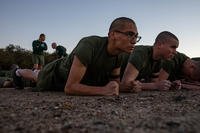After the National Geographic Channel's Fight Science television show on Special Ops, a majority of the emails received this week discussed mental toughness, as if I had some magic solution for people to acquire it.
The truth is that the human body is built for survival and will adapt to handle cold, heat, stress, pain and just about anything you can throw at it better. After years of training in cold water before, during and after my seven years in the SEAL teams, I got used to colder water, as seen in the Fight Science TV show.
However, if you look online, you will see that we all have something that makes us a little bit tougher. There are thousands of ways to get "mentally tough," and physical fitness is just one of them.
Mental toughness has many definitions and is not limited to athletic performance and pain tolerance. From an 85-year-old gardener to a high school wrestling friend, I have known many men and women whom I would define as "mentally tough."
Much of mental toughness is simply attitude and self esteem. If you do a search online, you will see a variety of mental toughness techniques and articles, along with stories of remarkable physical performances and acts of heroism in overcoming insurmountable odds and fear.
My philosophy has always been quite simple when it comes to mental toughness, as well as increasing your body's ability to withstand pain. My way is not the only way, just the catalyst I have used in the past to develop what I call mental and physical toughness that enabled me to graduate SEAL training more than 15 years ago. It works for me and many others who have attended physically challenging events and training programs.
I believe that in athletics especially, you will build mental toughness through tough workouts. Physiologically, your body will start to buffer lactate better if given the stimulus to do so, meaning we will adapt physically to get in better shape, and our muscles will fail later and later and later until we can surpass perceived limitations.
In a military environment, this method has been known to work, but adding training under stress, hunger and fatigue only will enhance performance on the battlefield. The saying, "The more you bleed in training, the less you bleed in war," applies to this philosophy.
Mental toughness requires tough conditioning, but there is a fine line between pain and injury. This takes hundreds of reps of exercises (both physical and military ops) or, for example, minutes of nonstop punching in a boxer's case. In my case, enormously high reps of push-ups, sit-ups, pull-ups, dips, running for miles and swimming for miles will create increased energy levels, an increased ability to buffer lactate and an increased pain tolerance through training in the pain zone.
You really have to get the body to know what pain is before you can endure it longer. Pain is not injury, but if you push too hard through it, you will be setting up for injury. Knowing your training limits is necessary as well.
And then the next day, when you feel like crap and you have to will yourself to work out again, that, too, is mental toughness. Persistence and determination are all factors as well. Other terms used to describe mental toughness are inspiration, self-motivation and confidence.
In the end, defining such an intangible quality is almost impossible. There have been many people who do not exercise at all and bring themselves out of horrible childhoods of poverty, neglect and illness to become heroes, mentors, millionaires and presidents. That takes mental toughness in my book.
One thing I do know, though, is that physical training programs will help your self-esteem and confidence, which is perhaps the first step to gaining mental toughness for some. But mental toughness -- how do you get it? Are you born with it? Can you acquire it?
Debates surrounding these questions have occurred long before there was Navy SEAL training. I am of the personal belief that mental toughness is born through tough physical training, proper mindset and a high level of maturity. This toughness is what propels you through several long days of no sleep, days of ruck marches without food and when you are battling a nagging injury. How do you get that?
Take, for example, five-time Tour de France winner Lance Armstrong, who beat cancer. He came back mentally tougher and has been at the top of his game ever since. Maybe he had it all along. Who knows? Mental toughness is not measurable and is completely internal, but I believe hard work will get you there. When Armstrong was asked recently by reporters whether he was on performance-enhancing drugs, he said: "I am on my bike, busting my ass for 6-8 hours a day!!"
So the question is, do you get mental toughness by attending Special Operations training schools, such as Ranger School, BUD/S, PJ Indoc and the Q Course, or by the training done beforehand? The answer is a combination of both. I feel I was mentally tough due to my training prior to attending SEAL training, but further developed my mental toughness so I emerged truly feeling I was capable of anything and would not quit -- ever.
I have seen many great athletes not graduate BUD/S and a few men not in that great of shape graduate through sheer determination and daily gut checks. The few who graduated had a common trait of being able to "play with pain" and a mental determination never to quit on themselves or, most importantly, their BUD/S classmates. Team sports in high school probably helped with that a bit, and men who played sports that require playing with pain, such as wrestling, football and lacrosse, et al., usually did quite well.
The key is to arrive ready to compete, not merely to survive. This is the biggest difference between those who graduate any special forces training and those who do not. You should be in the type of shape that will allow you to win or be in the top 10% of the class in every event. If you easily surpass the minimum standards (if not double them in pull-ups, pushups and sit-ups) on the respective physical fitness tests (PFTs), you will be in the top 10% of your class and surprised when you get there how many students barely can pass the PFT.
These are proven standards of a majority of the graduates when they arrive at any SF school. It does not mean you will graduate if you can ace the standards; many Navy SEAL students with maximum scores have quit. Whether you physically ace the PFT or barely pass it, it all depends on the mental toughness that will help you graduate.
How much pain can you play with? That is an unmeasurable element of the Navy SEAL student. However, one common denominator between most of the graduates who have this mental toughness is that they were also in great shape and did not mind being yelled at by the instructors. Finding humor in what happens to you daily is one of the best ways to get through the daily grind.
Everyone at Navy SEAL training will have their nemesis or weakness. For those who are great swimmers, they are usually poor runners. For those with great upper-body strength, they are usually not so great at running. Big guys weighing more than 200 pounds usually have a difficult time with running and the obstacle course, whereas little guys who wrestled in the past do not. They, though, typically are not great swimmers with fins or carry heavy rucksacks easily. Every now and then, you will find one person who is great at all the events, but usually even he struggles at one of the events and pushes himself harder to win.
In your journey to find mental toughness, remember to train smart and not push yourself to injury that will require medical attention. Rehab is a long and slow process that will delay your efforts significantly. Check out Stew Smith's Grinder PT - The Key to Mental Toughness Workout on the StewSmith.com eBook Fitness Store.
Thanks for your kind remarks this past week. Feel free to email if you have any questions about getting in shape for fitness testing. That is my specialty, not necessarily developing mental toughness. You have to do that and find your internal fuel to propel you to great things.
Stew Smith is a former Navy SEAL and fitness author certified as a Strength and Conditioning Specialist (CSCS) with the National Strength and Conditioning Association. Visit his Fitness eBook store if you're looking to start a workout program to create a healthy lifestyle. Send your fitness questions to stew@stewsmith.com.
Want to Learn More About Military Life?
Whether you're thinking of joining the military, looking for fitness and basic training tips, or keeping up with military life and benefits, Military.com has you covered. Subscribe to Military.com to have military news, updates and resources delivered directly to your inbox.


















